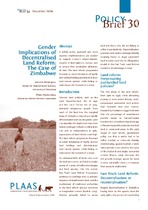| dc.contributor.author | Manjengwa, Jeanette | |
| dc.contributor.author | Mazhawidza, Phides | |
| dc.date.accessioned | 2019-02-25T11:43:49Z | |
| dc.date.available | 2019-02-25T11:43:49Z | |
| dc.date.issued | 2009 | |
| dc.identifier.citation | Manjengwa, J. et al. (2009). Gender implications of decentralised land reform: The case of Zimbabwe. Policy Brief 29, Bellville: Institute for Poverty, Land and Agrarian Studies, University of the Western Cape | en_US |
| dc.identifier.uri | http://hdl.handle.net/10566/4283 | |
| dc.description.abstract | A bolder policy approach and more
vigorous implementation are needed
to support women’s empowerment,
transfer of land rights to women, and
to ensure their productive utilisation
of land. The land reform programme
focussed on racial imbalances of highly
skewed land holdings and discriminatory
land tenure systems while failing to
mainstream the interests of women. | en_US |
| dc.language.iso | en | en_US |
| dc.publisher | Institute for Poverty, Land and Agrarian Studies, University of the Western Cape | en_US |
| dc.relation.ispartofseries | Policy Brief;30 | |
| dc.subject | Gender implications | en_US |
| dc.subject | Land reform | en_US |
| dc.subject | Zimbabwe | en_US |
| dc.subject | Land rights | en_US |
| dc.subject | Women | en_US |
| dc.title | Gender implications of decentralised land reform: The case of Zimbabwe | en_US |
| dc.type | Other | en_US |

